US Secretary of State Marco Rubio, the latest top US official to visit Israel, said Friday that “there is no plan B” for a Gaza ceasefire and that annexation of the West Bank by Israel would be “a threat to the peace process.”
Rubio stressed that Israel has met its commitments under the first phase of the ceasefire, which began on October 10, and that it would have to be “comfortable” with the make-up of the international force that will enter Gaza in the second phase, which is still being hashed out.
Hamas would have to disarm, release the remains of deceased hostages and “cannot be involved in governing Gaza in the future,” he said, adding that UNRWA, the UN agency for Palestinian refugees, could not help deliver aid to Gaza because it was a “subsidiary” of the terror group.
Broader regional normalization with Israel could be a “byproduct” of the Gaza ceasefire, added Rubio, who arrived in Israel on Thursday.
Speaking to journalists at the US-Israel Civil-Military Coordination Center in Kiryat Gat, which oversees the ceasefire, Rubio said, “This is a historic mission.”
Implementing the ceasefire plan is “not going to be a linear journey. There’s going to be ups and downs and twists and turns,” he said. “But I think we have a lot of reason for healthy optimism about the progress that’s being made.”
Secretary of State Marco Rubio speaks to the press at the Civil-Military Coordination Center.
— U.S. Embassy Jerusalem (@usembassyjlm) October 24, 2025
Rubio said there is an increasing presence of staff from the US State Department “and related entities” at the center, which “will continue to grow” to “provide personnel [for] things like emergency response and the coordination of humanitarian assistance.”
Shortly after Rubio spoke, the US State Department announced that longtime diplomat Steven Fagin would serve as the civilian lead of the Center. A career member of the Senior Foreign Service, Fagin has served as US envoy to several Middle East countries.
In order to get to the next phases of the ceasefire plan, Rubio said, the center is focused on ensuring the success of the initial phase of the ceasefire.
“We’ve got to get through the process that we’re involved in right now, which is making sure the ceasefire holds without anything disrupting it, making sure people are getting the life-sustaining aid that they need in a way that’s not being looted or stolen or diverted in any way, and at the same time, creating the conditions for the Stabilization Force to come in as soon as it possibly can be put together to provide the stabilization we need to move to the further phases of this plan,” he said.
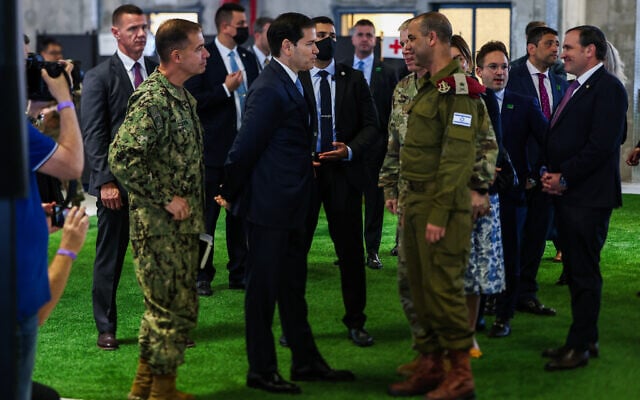
“On the other side of that Yellow Line,” he said, referring to areas of Gaza outside Israel’s control, “there is still a terrorist group that remains armed.”
“And we’ve seen them take actions against their own population,” said Rubio, alluding to instances of Hamas executing opponents.
He urged “that there be more media coverage given to the fact that Hamas has brutalized Palestinians, has brutalized Gazans over the last few days. That’s something to point to.”
Asked about reported claims by Hamas that it is part of the committee forming Gaza’s next government, Rubio appeared to dismiss the notion and stressed that Hamas can have no role in the future governance of Gaza. He said that all the countries now working with the US on Trump’s 20-point Gaza peace plan had agreed to that.
“Everyone who signed onto this plan, all of these other countries, agreed, everyone agreed, that Hamas cannot govern, and cannot be involved in governing the future of Gaza. Everyone’s agreed to that.”
West Bank annexation would ‘threaten this whole process’
Rubio declined to say at the press conference that Israel would need US “permission” to renew fighting against Hamas in Gaza if the group continues to pose a threat, while emphasizing that the US ceasefire plan has broad regional support and is “the best” and “only plan.”
Asked if Israel could resume fighting Hamas independently if the group rearms or regroups, Rubio said, “I don’t think this has to do anything with permission or anything of that nature. This has to do with basically, we’re all committed to making this plan work. There is no plan B. This is the best plan. It’s the only plan. It’s one that we think can succeed. It’s one that we believe is on the way to success.
“If Hamas refuses to demilitarize, it’ll be a violation of the agreement, and that’ll have to be enforced,” he said, in response to a separate question. “I’m not going to get into the mechanisms by which it is going to be enforced, but it’ll have to be enforced.”
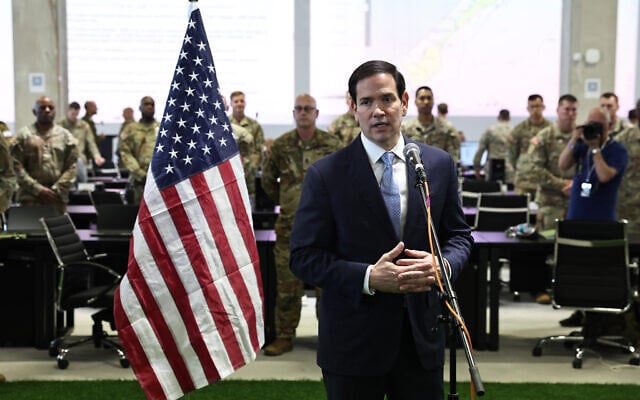
Rubio went on: “This is a deal, and a deal requires conditions to be met. Israel has met their commitments. They’re standing at the Yellow Line, and that is contingent upon the demilitarization,” he said, noting that demilitarizing Gaza under the second phase of the deal would be “a long-term project.”
“We want to help create the conditions here so that people in Gaza don’t have to be terrorized by Hamas and in fact, have lives, jobs, businesses and a better future,” he said.
Rubio’s comments came a day after US Vice President JD Vance, at the end of a visit to Israel, slammed as “very stupid” a preliminary vote by the Knesset to apply Israeli sovereignty to West Bank settlements, which was opposed by Prime Minister Benjamin Netanyahu.
Following Vance’s criticism, Netanyahu tried to distance the government from the vote, falsely claiming that it was an opposition “provocation” opposed by his religious coalition partners and all but “one disgruntled member” of his own Likud party. (In fact, the majority of votes in favor of the bill, which cleared its preliminary reading 25-24, were cast by coalition members, with Netanyahu’s far-right coalition partners in Religious Zionism and Otzmay Yehudit supporting it.)
Rubio on Friday echoed Netanyahu’s statement, saying the vote was led by “elements that tried to use it to embarrass Netanyahu” during Vance’s visit.
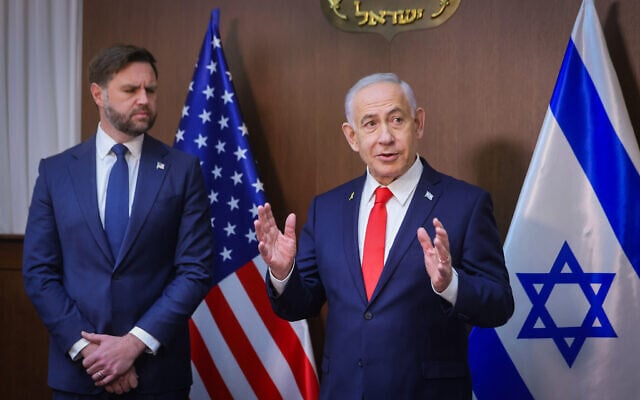
“Suffice it to say, we don’t think it’s going to happen,” Rubio said of annexation. “More importantly, it’s not, from a legislative standpoint, structured in a way that could happen.
“But it would also threaten this whole process,” he added, referring to the Gaza ceasefire. “Everyone has to understand if something like that were to happen right now, a lot of the countries that are involved in working on this probably aren’t going to want to be involved in this anymore.
“It’s a threat to the peace process, and everybody knows it,” Rubio said. “But I’m not getting to the middle of Israeli politics. We’re focused on peace and security.”
UNRWA a ‘subsidiary of Hamas’
Asked if UNRWA will assist in providing humanitarian aid to Gaza under the ceasefire plan, Rubio said: “UNRWA is not going to play any role in it.”
The comment came after the International Court of Justice on Wednesday dismissed Israel’s allegations that Hamas had infiltrated the aid agency and ruled that Israel was obligated to cooperate with it, despite a law passed by the Knesset last year that banned such cooperation. Israel has reportedly informed the US that it will not comply with the ICJ’s non-binding position.
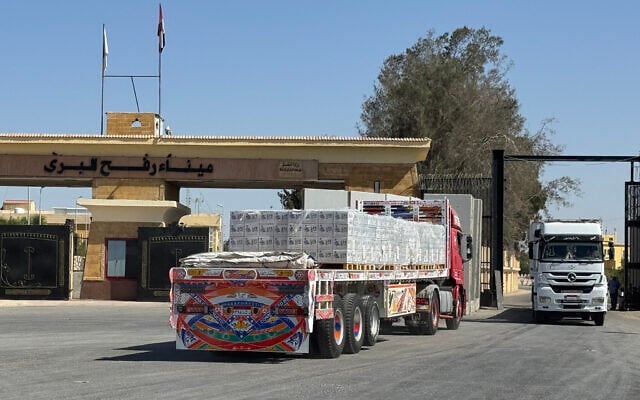
“The UN is here,” Rubio said. “We’re seeing the work they’re doing, the World Food Programme. There’s also nonprofit NGOs, humanitarian assistance organizations that are involved in this, Samaritan’s Purse. It’s a conglomeration of about 8-12 groups that are here.”
“We’re willing to work with them if they can make it work. But not UNRWA. UNRWA became a subsidiary of Hamas,” Rubio said.
Israel’s claims that UNRWA has been thoroughly infiltrated by Hamas, that hundreds of UNRWA employees are Hamas members, that UNRWA employees participated in the October 7, 2023, massacres, and that the agency disseminates incitement to hatred and violence against Israel.
When asked about the involvement of Turkey in Gaza’s post-war governance, Rubio also said Israel must be “comfortable” with the countries deploying troops to the territory as part of the International Stabilization Force envisioned under the ceasefire.
Israel has reportedly told the US that the presence in Gaza of troops from Turkey, a Hamas ally, would be a red line.
“We haven’t formed that force yet, so there’s still work going on,” Rubio said Friday. “Obviously, as you put together this force, it’ll have to be countries that Israel is comfortable with as well.”
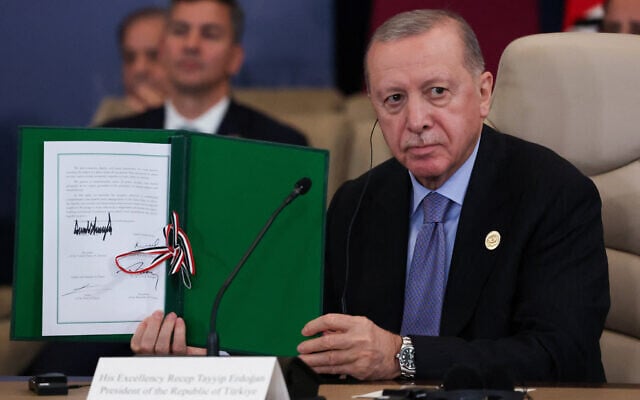
“There are a lot of countries that are expressing interest right now,” said Rubio. “I don’t want to get into anything on who’s being vetoed, who’s not being allowed. Obviously, every member of this force has to be someone who has the capability and willingness, but also someone that everyone’s comfortable with, including Israel.”
Asked separately about the Palestinian Authority’s role in Gaza’s post-war governance, Rubio said, “We’ve expressed our concerns about the Palestinian Authority as it stands today.”
Israel has rejected a role for the Palestinian Authority in Gaza, saying the body incites to terrorism in its school system and through payments to terrorists.
“Certainly the need for reform as far as what role it’s going to play in the future of Gaza,” said Rubio. “That’s yet to be determined, if any role at all. We don’t know.”
Gaza’s future governance “is going to be something that has to be worked on collectively with Israel, with partner nation states. For it to work, everyone has to agree to it,” he said, emphasizing that Gaza “cannot be a place that is governed by anyone who wants to use it as a launchpad for attacks against Israel.”
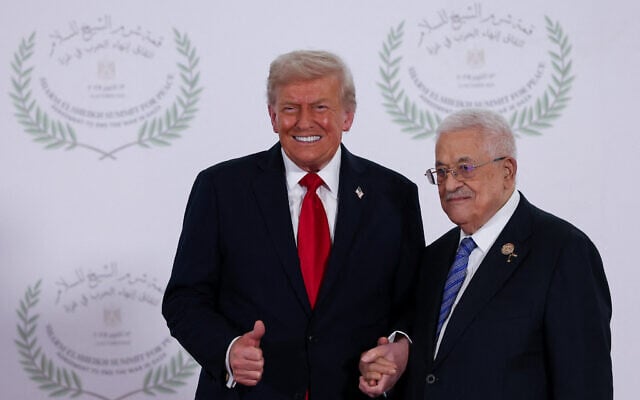
“If it is, then there will be another war,” he said. “There will never be peace as long as there’s an area or a territory that’s being used as a launchpad to threaten Israel’s security. Everyone understands that, and everyone who signed on to this deal understands that.”
In addition, Rubio said, the remains of 13 slain hostages “are going to be released” from Gaza.
“That’s going to happen,” he said. “If it doesn’t, then the deal got broken, but it’s going to happen.”
Israel has accused Hamas of withholding the remains of slain hostages it has access to, in violation of the deal, but the White House has not publicly embraced Israel’s account. Hamas claims it is working to locate the remaining bodies under the rubble in Gaza.
In accordance with the deal, Hamas released the last remaining 20 hostages on October 13, within 72 hours of Israel’s October 10 withdrawal to the Yellow Line. All were young men abducted on October 7, 2023, when Hamas-led terrorists stormed southern Israel to kill some 1,200 people and take 251 hostages, sparking the war in Gaza.
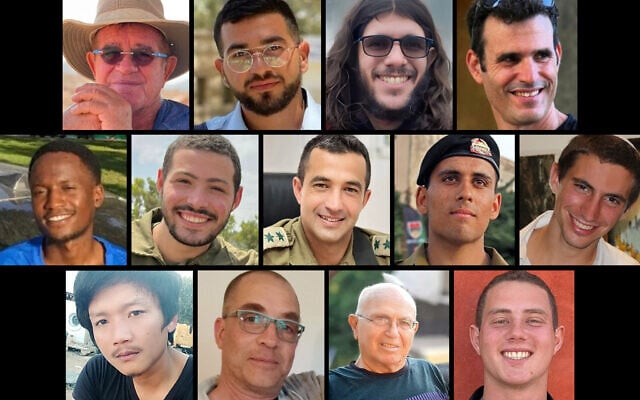
Rubio said the end of the war could open the door to expanding the Abraham Accords, which normalized relations between Israel and several Arab nations, and which were brokered by US President Donald Trump in 2020, during his first term.
Broader regional normalization “could be a byproduct of achieving some of this,” he said. “We’d like to have as many members of the Abraham Accords as possible.”
“I think what we’re doing here could help create the momentum for that to occur,” he added. “I’m not going to mention the countries’ names because it’s up to them to announce it.”
“There are some countries you could probably add right now if we wanted to, but we want to do a big thing about it, and so we’re working on it,” said Rubio.

